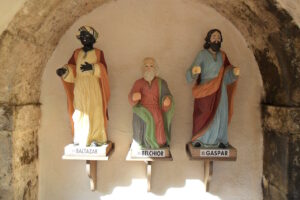Reflection for the Third Sunday of Lent C
Readings: Exodus 3: 1-8a, 13-15 (RM) or Isaiah 55:1-9 (RCL); Psalm 103 (RM) or 63 (RCL); 1 Corinthians 10: 1-6, 10-12 (RM) or 1-13 (RCL); Luke 13: 1-9.
Ardet nec consumitur. “It burns but is not consumed.”
We’re looking at a Latin motto referring to the burning bush that spoke to Moses.
We’re looking at the label on a Belgian beer bottle.
Now there are hundreds of different kinds of beer produced in Belgium, and many of them are named after some aspect of religion: Lucifer, Devil, Forbidden Fruit. This one was originally produced at the Abbey of Grimbergen, just outside Brussels. One can understand the “devilishly” daring references used to sell beer. But the burning bush?
To say Moses was surprised when, first, he saw a burning bush that did not burn out, and second, the bush spoke to him – well, “surprise” is a total understatement. This type of story is called a theophany, a self-revelation of the Divine. These accounts were common in the ancient world, using such elements as the mountain as the place where God is found, and the symbol of fire to indicate divine presence.
There are several devilish little surprises hiding mischievously below the surface. The first is the play on words, tying together the name of this holy mountain, variously called Horeb or Sinai, and sĕreh, the Hebrew word for thorn bush. Both the mountain and the bush are sites of divine revelation.
Then we’ve got the new name of the Divine: “I Am” (ehyeh in Hebrew) or “I Am Who Am” (ehyeh asher ehyeh). One interpretation is “I Am Who Causes To Be What Comes Into Existence,” or, much less awkwardly, “Source of All Being.”
Yet another interpretation is “I Will Be With You.” In Hebrew the verb is in the imperfect tense, which means an action begun in the past is still active and operative in the present. “I Am” was, is, and evermore shall be, continually active, eternally dynamic, never disappearing, never dying.
Lastly, “I Am” self-identifies as the God of the ancestors. And yet, the God who is doing something new requires a new name. Moses, one member of the people who longs for liberation, will serve as the carrier of this new name, and with it, hope for a future of freedom and safety. This God is not an abstract idea, but the living God who loves passionately and intervenes continually in human history.

The active nature of the name of God is a common thread running through all three readings this week, folding the transcendent mystery and grandeur of God into the cries of those dispossessed, driven from their destroyed homes, separated from loved ones, and threatened with death, in our time as well as in the past. It lifts the soberness of Lent above simple acts of personal piety into full solidarity. Reginald H. Fuller writes,
“Such is the challenge of Lent. It is directed not merely to devout individuals, but to the church as an established institution.”
Thus “I Am” is not merely an unexplained phenomenon, or a hallucination by one person, alone and high up on a mountain. I Am is a promise of liberation for those oppressed, enslaved or terrorized by any earthly power, a promise made by the eternally living God.
I used to use a different Belgian beer bottle as a teaching tool in my Liturgy course. When we talked about the research work done in 19th century Benedictine monasteries on worship that contributed to the liturgical reforms of Vatican II, I’d pass around an empty bottle of the fine brew from the Abbey of Maredsous, just to show the monastery on the label. Student reactions ranged from hopeful peering into the empty bottle, to “I don’t drink. Why am I being handed this?”
The idea was: these monasteries were founded out of a right-wing movement that swept the pendulum to the opposite of the anticlericalism of the French Revolution. They were financed with both old aristocratic and new industrialist money, to act as a conservative force maintaining top-down control in the society by means of traditional piety. So what happened? The opposite. After 100 years or so, we saw a powerful wave of renewal across a number of Christian denominations.
There is always hope. And sometimes there are surprises.
© Susan K. Roll
This Reflection has been lightly edited from that of March 20, 2022.
Susan Roll retired from the Faculty of Theology at Saint Paul University, Ottawa, in 2018, where she served as Director of the Sophia Research Centre. Her research and publications are centred in the fields of liturgy, sacraments, and feminist theology. She holds a Ph.D. from the Catholic University of Leuven (Louvain), Belgium, and has been involved with international academic societies in liturgy and theology, as well as university chaplaincy, Indigenous ministry and church reform projects.




